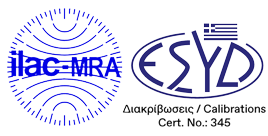Standardization
The process which specifications, i.e. regulations, are established which set the necessary rules for the production, composition and properties that a product must have. The competent body for standardization in Greece is the Hellenic Organization for Standardization (E.L.O.T.), and it processes issues for standardization at National, European (CEN/CENELEC) and International (ISO/IEC) levels with the help of technical committees, the which are staffed with specialist scientists of all specialties.
Certification
The confirmation that a product or service has been produced according to a standard and meets the specifications contained therein. According to the European standard EN 45020, certification is the process by which the agreement or compliance of a product with prescribed requirements is improved.
Accreditation of calibration or testing laboratories
It essentially determines the technical competence of each laboratory to carry out calibration work on predetermined measurement sizes (e.g. Dimensions: Micrometers, Thickness Gauges, Electricity: Voltmeters, Ammeters, etc.). We can say that Accreditation is the process of official recognition by a competent organization, that a legal or natural person carries out specific activities with documented competence and impartiality.
Metrology
The science that deals with measurements, measuring instruments, the reliability of instruments and measurements, units of measurement and in general with what concerns the accurate and acceptable determination of the values of the quantities that determine the properties of bodies or systems.
Calibration
It is the set of processes that validate / determine, under specific conditions, the relationship or interdependence between values of quantities indicated by a measuring instrument or measuring system, or values representing measurement of material or standard material, and the corresponding values realized by the standards. In simple everyday language instrument calibration is the set of actions implemented by a calibration laboratory with the objective of determining the error values of a measuring instrument or even determining other metrological properties of the instrument.
Accuracy
Accuracy is a well-known term that describes the interval of any measurement. Accuracy estimates the interval in which the true value of the measured quantity is contained.
Measurement Uncertainty
Measurement uncertainty is related to the measurement result and characterizes the distribution of values that could reasonably be attributed to the measured quantity. Its calculation for each measured quantity (Uncertainty Budget) is based on the version ΕΑ-4/02 ''Evaluation of the Uncertainty of Measurement in calibration'' and is detailed in the calibration process. The uncertainty in the result of a measurement generally consists of several components, which can be categorized into two main components depending on how they are calculated: Type A uncertainties calculated by statistical methods and Type B uncertainties calculated by other means.
Traceability
The property of the result of a measurement or the value of a standard by which there can be correlation to specified standards, usually national or international standards, through an unbroken chain of comparisons, having specified measurement uncertainties.
Some of the above terminologies are based on the updated guide:
International Vocabulary of Metrology Fourth edition – Committee Draft (VIM4 CD) 11 January 2021

